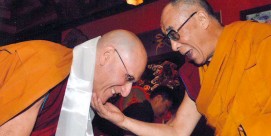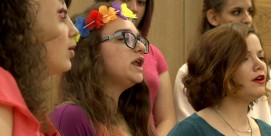The Dalai Lama at the Aspen Institute
Read excerpts from the Dalai Lama’s November 15, 2005 remarks at the Aspen Institute in Washington, D.C.
Number one, my commitment is promotion of human values, not on the basis of religious ethics, religion faith, but without religious faith, using our common sense and also some scientific findings. [A] more compassionate person [is] happier and the brain functions, I think, more normal. So through that way, maybe longer life. Too much stress, too much agitated mind, less sleep — then eventually shorter life. So that is my main commitment. This commitment will remain until my death.
Then second commitment — promotion of religious harmony. I am speaking as a Buddhist. I am Buddhist monk, so through my own little experience I know I can feel the value of other traditions. All traditions in spite of different philosophy, different concept, all have the same potential to provide humanity [with a] certain inner value. Therefore the harmony among the different religious traditions is very essential. Sometimes I think that due to conflict in the name of religion, some people really feel fed up about religion. That is a great pity. Various different religious traditions — if we implement sincerely, practice sincerely, then I think there [is] good potential.
Love, compassion, forgiveness, tolerance, contentment, self-discipline — now these are the essence of all teaching, whether Christianity or Islam or Judaism or Hinduism or Buddhism. Same essence. Same message. So if a person follows one of these religions [and] they practice these things, then I think automatically your mind becomes more calm, more compassionate. Due to calmness of mind, I think your mental function becomes more normal, more peaceful. I think the mental function [is] more effective. It is in this way we can see the effect of spirituality. On the other hand, if you use religious faith, or rather the name of religion, in [a] different purpose, then the name of religion may create more restlessness. So [it] depends on the use of religion as a method to bring calmness — then certainly all major religious traditions [are] helpful.
Without religious faith, meditation or training of mind like some scientists do that, without religious faith, but simply certain techniques to increase, I think, the power of attention — these things they do.
Within my limited knowledge of the Bible, it teaches the essential part — compassion, forgiveness, these things — very clearly. Many of the essential teachings of Christianity are in fact illustrated by the example of the life of Christ. There could be a certain aspect of the Bible which reflects a particular cultural and social condition of Middle East society at that time. That part I think can change. That aspect of the tradition — perhaps it’s not wise to insist on unchangeability, because that part of the tradition may be amenable to change due to circumstances.
If I attach towards my own faith, [that] is essentially against the teaching of the essence of Buddha. One Christian, one Muslim, one Jew — while very much faithful to one’s own tradition, then more attachment, so forgetting and neglect about essential teaching — compassion, tolerance, these things — I think that may be one factor [in religious strife].
I think important is the oneness of entire humanity — that feeling. Then I think in the field of religion — more dialogue, more interaction. According to my own experience, after I came to India and became a refugee, then as far as Christianity is concerned, after I met the late Thomas Merton I really learned the value of Christianity immensely from him. Not just words — his behavior. [He was] just like a Tibetan Buddhist monk. Even his hairstyle was similar to the Buddhist monk. When he came to Dharamsala [he wore] big boots. He was a Trappist monk. We spent a few days and each day a few hours [together]. Then I really developed admiration about Christian faith and particularly the monastic way of life. Then on a few occasions [when] I visited some Christian monastery or nunnery, I really admire their way of life — simplicity and great devotion to their own tradition. So personal contact is very, very useful [for religious dialogue].
Some of my friends believe moral ethics should have [a] base of religious faith. That I do not agree [with]. In that case the understanding of moral ethics becomes quite narrow. Then secondly, a further complication: Which faith? If you say moral ethics must be based on religious faith, then what religion? Theistic or nontheistic? Within theistic — Christianity or Judaism or Muhammadism? Further complication: within Christian — Catholic, Protestant? Muslim: Sunni, Shia? A lot of problems, isn’t it? Within Buddhism also: Therevada or so-called Mahayana? And within Mahayana, Chinese tradition or Tibetan tradition or Ladakhan tradition? Too complicated. So religious faith [is] entirely up to the individual, not society.
To some people “secular” means rejection of religion. In India, we take the meaning of secularism as respect of all religions and also respect of the nonbeliever. India’s constitution is also based on secularism. So in India all religious people have the same sort of right, the same respect.
I get up early morning, usually at 3:30. Then some exercise. Then prayer, some meditation, some recitation. Then 5:30, my breakfast. Very heavy breakfast, because as a Buddhist monk the previous day — no dinner, so usually when I get up I feel hungry. Sometimes in airplanes the breakfast [is] very poor, so therefore I always carry bread in my bag. Very useful. One lady wanted to know what is inside [my bag.] I showed [her] the bread — this is my next morning’s breakfast. I told her that beside what is served on the plane, this is my own addition! Then up to 8:00 or 9:00 — meditation. My meditation [is] mainly analytical meditation.
Interest in Chinese society toward spirituality I think [is] growing quite rapidly. I was told recently by one Chinese that annually about 5 million Chinese turn to Christianity. I don’t know how many [Chinese are] Buddhists.
I really wish to be another body to promote human values. That’s my dream or my wish, and on the other hand to further research about the human brain and the connection between human emotions and brain.







